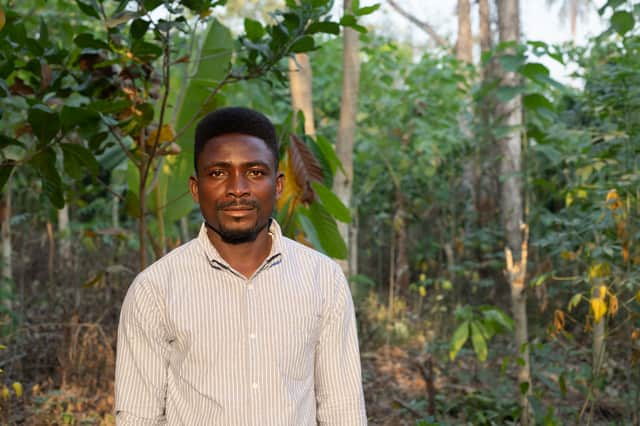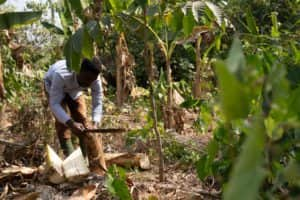Fairtrade Fortnight: how the chocolate you buy can make a real difference


Bismark Kpabitey recalls a more prosperous time.
Based in the Ahafo region of Ghana, the Fairtrade cocoa farmer hails from a family of cocoa farmers.
Thanks to the good living they made from the crop, Bismark was able to go to school and get a degree but these days things are much harder.
Advertisement
Hide AdAdvertisement
Hide AdIn his region, he has seen a drastic decrease in his cocoa harvests because plants have not survived disease, pests and unpredictable rains.
“I remember when I was young, the yield of cocoa was sizeable,” said Bismark, 36. “But now, people make nothing. My income has dropped about 70-80 percent, I should be able to harvest 16 bags of cocoa beans, today the most is two or three bags.
“Looking at the situation now it is very difficult to go into agriculture because the rainfall pattern has changed. There is a long drought – currently we are experiencing a very hot sun, which is affecting our crops and has really reduced production. And once production is reduced, financially you become handicapped. That is the challenge.”


Fairtrade Fortnight shows how what we buy can help farmers
This year’s Fairtrade Fortnight, which runs until March 6, is highlighting how buying Fairtrade is a simple yet effective way to support farmers and workers in low-income countries as they work to adapt to the effects of climate change.
Advertisement
Hide AdAdvertisement
Hide AdAccording to the Fairtrade Foundation, the climate crisis is the biggest threat to the livelihoods of millions of small-scale farmers and agricultural workers in low-income countries worldwide.
It argues that without a fairer income, farmers and workers are unable to invest in the types of mitigation and adaptation techniques needed to protect the environment, and their businesses.
“We are all facing an existential planetary threat and politicians are still not moving fast enough to stand a chance of keeping warming to 1.5 degrees,” said Nilufar Verjee, director of public engagement at the Fairtrade Foundation.
“Current levels of global heating are already disastrous for the farmers and workers who grow our food – they need the cash to adapt to new ways of farming.
Advertisement
Hide AdAdvertisement
Hide Ad“Poverty and environmental damage in our food supply chains will not end until exploited farmers are paid fairly, have the power to make their own choices and to plan for the future. Only then will they be able to effectively fight the impacts of the climate crisis.
“This also matters to UK conscious consumers and businesses. Climate change, and the ability of farmers to grow their produce, is also threatening the survival and sustainability of supply chains behind some of the UK’s best-loved imports, such as coffee, cocoa and bananas.”
New data reveals that more than 60 percent of the British public are unaware of the threats that climate change poses to UK supplies of cocoa, coffee and bananas.
The consumer survey, commissioned by the Fairtrade Foundation and run by Opinium, reveals that whilst public understanding of the links between decent incomes for farmers and climate resilience is low, there is a strong public willingness to address inequality caused by exploitative trade and climate change.
Advertisement
Hide AdAdvertisement
Hide AdThis follows new research from VU Amsterdam and Bern University of Applied Sciences revealing that over the next three decades, adverse climate conditions will trigger a drastic decline in banana yields in 10 countries.
Furthermore, a rise of just 2.1°C could leave 89.5 per cent of land used to cultivate cocoa unsuitable by 2050.
“It’s clear that the public want to see an end to trade that exploits those who produce the commodities we rely on every day – particularly in the context of climate,” said Michael Gidney, CEO of the Fairtrade Foundation.
“Cocoa brings so much joy to anyone who loves chocolate, but more needs to be done to ensure that farmers growing these products are supported to live and work well, and build their resilience to the devastating impacts of the climate crisis.
Advertisement
Hide AdAdvertisement
Hide Ad“Farmers in low-income countries are already using their expertise to tackle climate change, but they urgently need more resources and decent incomes to do so.”
Fairtrade’s Choose The World You Want Festival is running online throughout the two weeks, featuring virtual events designed to engage and inform people about the harmful impact of the climate crisis on farmers and food supplies.
“Through Fairtrade Fortnight, and the Choose the World You Want Festival, we want to help more consumers to recognise the role they have in helping farmers and workers adapt to climate change,” said Michael.
“By choosing Fairtrade, they can make a real, tangible difference to the lives of people who grow much of the food we love to eat in the UK.”
Advertisement
Hide AdAdvertisement
Hide AdPart of Fairtrade-certified Kuapa Kokoo, Bismark and other members of the co-operative benefit from the Fairtrade Premium, an additional sum on top of sales, which has been invested in training for farmers, as well as health clinics and water pumps in areas where the community didn’t have access to good drinking water.
He was also part of a project from Fairtrade Africa and various partners to help young people stay in farming, learning how to adapt to and mitigate against climate change.
“We are going to restore our forests back, this is what the Fairtrade system has brought to us,” said Bismark.
To find out more, visit www.fairtrade.org.uk/fortnight.